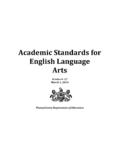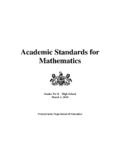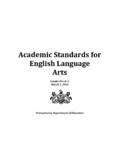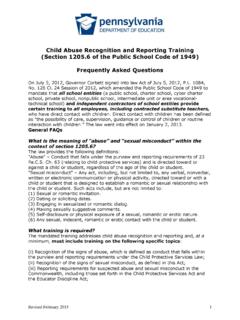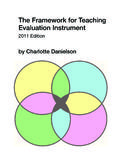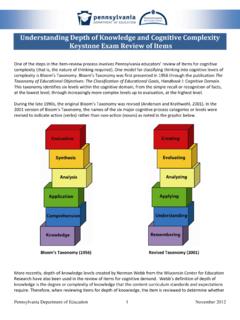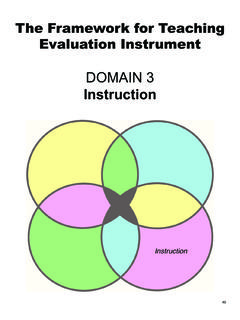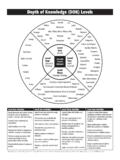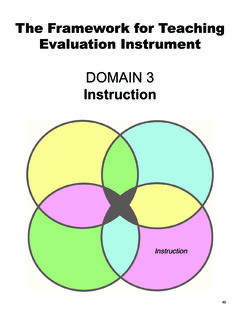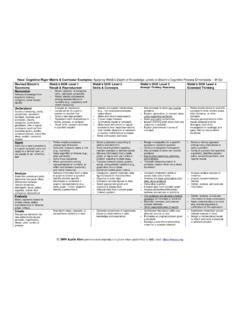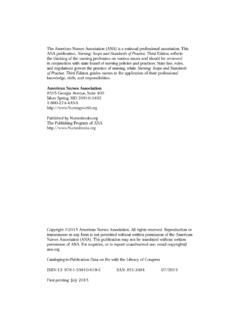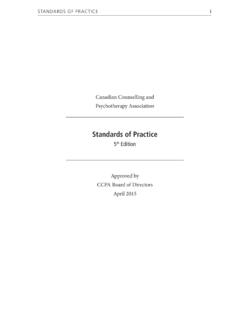Transcription of ASCA National Standards for Students - pdesas.org
1 ASCA National Standardsfor StudentsONE VISION ONE VOICEC itation Guide When citing from this publication, use the following reference: American School Counselor association (2004). ASCAN ational Standards for , VA: 2004 by the American School Counselor AssociationASCA National Standardsfor Students One Vision, One VoiceProfessional school counselors everywhere proudly share the same simple vision to prepare today s Students tobecome tomorrow s adults. The American School CounselorAssociation (ASCA) not only supports this idea, it has made itthe association s reform movements of the late 20th and early 21st centuries, such asstandards-based education and the No Child Left Behind legislation, focused onraising teacher quality and academic achievement. Unfortunately, these effortsignored the emotional, physical, social and economic barriers that can inhibit stu-dent success. This is where school counselors make a difference. School counselorsare actively committed to eliminating these obstacles and to helping studentsunderstand that the choices they make now will affect their educational and careeroptions in the future.
2 ASCA National Standards for Students was established to help school counselorshelp Students . ASCA National Standards identify and prioritize the specific atti-tudes, knowledge and skills that Students should be able to demonstrate as a resultof participating in a school counseling program. Best of all, by adopting and imple-menting ASCA National Standards , school counselors change the way school coun-seling programs are designed and delivered across our Development of StandardsThe development of ASCA National Standards for Students required an examina-tion of theory, research and practice to ensure that all aspects of school counselingwere considered. The process solicited broad-based involvement from all segmentsof the school counseling community to determine what purpose the Standardswould serve and what their content would be. Through pilot surveys at ASCA snational Delegate Assembly in April 1995 and a revised survey to more than 2,000 ASCA members in September of that year, ASCA was able to gather input onschool counselor attitudes and to initiate the movement toward adopting Standards movement has provided ASCA with a timely opportunity to betterdefine the role of school counseling in the American educational system and estab-lish similar goals, expectations, support systems and experiences for all studentsacross the country.
3 Additionally, on the local level, National Standards offer anopportunity for school counselors, school administrators, faculty, parents, businessesand the community to engage in conversations about expectations for Students aca-demic success and the role of counseling programs in enhancing student learning. Finally, ASCA National Standards for Students serves as the foundation for TheASCA National Model: A Framework for School Counseling more than 50 years of research, theory and practice, the NationalModel helps school counselors design and implement programs that meet theNational Standards and establish school counseling as an integral component of theacademic mission of their schools. ASCA s decision to participate in this educational reform agenda through thedevelopment of National Standards for Students offers an opportunity for theschool counseling profession to implement the goals deemed important by theprofession, to promote its mission in educational reform and to ensure that all stu-dents have access to comprehensive school counseling programs as part of thelearning look forward to having you join us on this mission!
4 AcknowledgmentsASCA is most grateful to Chari A. Campbell, ; Carol A. Dahir, ; SueReynolds; Carolyn B. Sheldon; and Michael J. Valiga, , for their work indeveloping the ASCA National Standards and accompanying Standardsfor Students (COMPETENCIES AND INDICATORS)Legend: = Academic Domain, Standard A, Competency 1 and Indicator 1 Academic DevelopmentASCA National Standards for academic development guide school counseling pro-grams to implement strategies and activities to support and maximize each stu-dent s ability to learn. Standard A: Students will acquire the attitudes, knowledge and skillsthat contribute to effective learning in school and across the lifespan. A:A1 Improve Academic Self- feelings of competence and confidence as learners a positive interest in pride in work and mistakes as essential to the learning attitudes and behaviors that lead to successful learningA:A2 Acquire Skills for Improving Learning time-management and task-management how effort and persistence positively communications skills to know when and how to ask forhelp when knowledge and learning styles to positively influenceschool performanceA:A3 Achieve School responsibility for their the ability to work independently, as well as theability to work cooperatively with other a broad range of interests and abilities dependability, productivity and knowledgeStandard B: Students will complete school with the academic preparation essential to choose from a wide range of substantialpost-secondary options, including.
5 B1 Improve Learning the motivation to achieve individual and apply critical-thinking skills the study skills necessary for academic success at information and support from faculty, staff, family and apply academic information from a variety knowledge of learning styles to positively influence a self-directed and independent learnerA:B2 Plan to Achieve challenging academic goals in elementary, middle/jr. high and high assessment results in educational and implement annual plan of study to maximizeacademic ability and knowledge of aptitudes and interests to goal problem-solving and decision-making skills to assessprogress toward educational the relationship between classroom performanceand success in post-secondary options consistent with interests,achievement, aptitude and abilitiesSTANDARD C: Students will understand the relationship of academ-ics to the world of work and to life at home and in the :C1 Relate School to Life the ability to balance school, studies, extracurric-ular activities, leisure time and family life co-curricular and community experiences to enhance theschool experience the relationship between learning and an understanding of the value of lifelong learn-ing as essential to seeking, obtaining and maintaining that school success is the preparation to make thetransition from student to community how school success and academic achievementenhance future career and vocational opportunitiesCareer DevelopmentASCA National Standards for career development guide school counseling pro-grams to provide the foundation for the acquisition of skills, attitudes and knowl-edge that enable Students to make a successful transition from school to the worldof work, and from job to job across the life span.
6 Standard A: Students will acquire the skills to investigate the worldof work in relation to knowledge of self and to make informedcareer :A1 Develop Career skills to locate, evaluate and interpret career about the variety of traditional and nontraditional an awareness of personal abilities, skills, interests Learn how to interact and work cooperatively in Learn to make Learn how to set Understand the importance of Pursue and develop competency in areas of Develop hobbies and vocational Balance between work and leisure timeC:A2 Develop Employment Acquire employability skills such as working on a team, prob-lem-solving and organizational Apply job readiness skills to seek employment Demonstrate knowledge about the changing Learn about the rights and responsibilities of employers Learn to respect individual uniqueness in the Learn how to write a r sum Develop a positive attitude toward work and Understand the importance of responsibility, dependability, punctuality, integrity and effort in the Utilize time- and task-management skillsStandard B: Students will employ strategies to achieve futurecareer goals with success and.
7 B1 Acquire Career Apply decision-making skills to career planning, course selec-tion and career Identify personal skills, interests and abilities and relate themto current career Demonstrate knowledge of the career-planning Know the various ways in which occupations can be Use research and information resources to obtain career Learn to use the Internet to access career-planning informa- Describe traditional and nontraditional career choices andhow they relate to career Understand how changing economic and societal needs influ-ence employment trends and future trainingC:B2 Identify Career awareness of the education and training neededto achieve career and modify their educational plan to support employability and job readiness skills in internship, mentoring, shadowing and/or other work course work that is related to career a career-planning portfolioStandard C: Students will understand the relationship between per-sonal qualities, education, training and the world of :C1 Acquire Knowledge to Achieve Career Understand the relationship between educational achievementand career Explain how work can help to achieve personal success Identify personal preferences and interests influencing careerchoice and Understand that the changing workplace requires lifelonglearning and acquiring new Describe the effect of work on the importance of equity and access in that work is an important and satisfying means ofpersonal expressionC.
8 C2 Apply Skills to Achieve Career how interests, abilities and achievement relate toachieving personal, social, educational and career how to use conflict management skills with peers to work cooperatively with others as a team academic and employment readiness skills in work-based learning situations such as internships, shadowingand/or mentoring experiencesPersonal/Social DevelopmentASCA National Standards for personal/social development guide school counselingprograms to provide the foundation for personal and social growth as studentsprogress through school and into adulthood. Standard A: Students will acquire the knowledge, attitudes and inter-personal skills to help them understand and respect self and :A1 Acquire Self-knowledge positive attitudes toward self as a unique and wor-thy values, attitudes and the goal-setting change is a part of and express between appropriate and inappropriate personal boundaries, rights and privacy the need for self-control and how to practice it cooperative behavior in personal strengths and and discuss changing personal and social and recognize changing family rolesPS:A2 Acquire Interpersonal that everyone has rights and alternative points of , accept, respect and appreciate individual , accept and appreciate ethnic and cultural and respect differences in various family effective communications that communication involves speaking, listening and nonverbal how to make and keep friendsStandard B: Students will make decisions, set goals and take neces-sary action to achieve.
9 B1 Self-knowledge a decision-making and problem-solving consequences of decisions and alternative solutions to a effective coping skills for dealing with when, where and how to seek help for solvingproblems and making how to apply conflict resolution a respect and appreciation for individual andcultural when peer pressure is influencing a long- and short-term alternative ways of achieving persistence and perseverance in acquiring knowledgeand an action plan to set and achieve realistic goalsStandard C: Students will understand safety and survival :C1 Acquire Personal Safety knowledge of personal information ( , telephone number, home address, emergency contact) about the relationship between rules, laws, safety andthe protection of rights of the about the differences between appropriate and inap-propriate physical the ability to set boundaries, rights and per-sonal between situations requiring peer support andsituations requiring adult professional Identify resource people in the school and community, andknow how to seek their effective problem-solving and decision-making skillsto make safe and healthy about the emotional and physical dangers of sub-stance use and how to cope with peer techniques for managing stress and coping skills for managing life eventsAbout ASCAThe American School Counselor association (ASCA) is a world-wide nonprofit organization based in Alexandria, Va.
10 Founded in1952, ASCA supports school counselors efforts to help studentsfocus on academic, personal/social and career development sothey not only achieve success in school but are prepared to leadfulfilling lives as responsible members of society. With a motto of One Vision, One Voice, the association provides professionaldevelopment, publications and other resources, research and advo-cacy to professional school counselors around the more information on ASCA, or to order The ASCA NationalModel: A Framework for School Counseling Programs, , or call (703) 683-ASCA (2722).1101 King St., Suite 625, Alexandria, VA 22314(703) 683-ASCA, (800) 306-4722, fax: (703)
